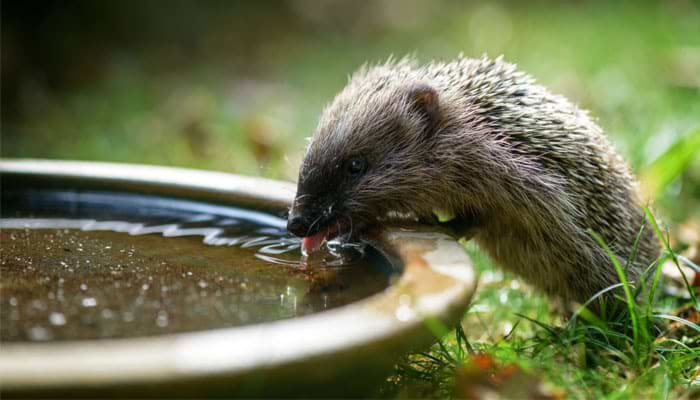
© inkevalentin / Adobe Stock
June is the start of the hoglet season, and many females will be pregnant, or may have already given birth to suckling youngsters. Don't ever be tempted to go too close and peer into a nest, as she may be startled and abandon her young. Be patient and keep an eye on the nest from afar! If you spot a hedgehog in your garden, it will almost certainly be a female, as the males tend to be more nomadic and don't often stay around. The female commonly has four or five hoglets in a litter and will care for them on her small home patch. She can't travel far in her search for food, as the hoglets don't leave the nest until they're around four weeks old. Mum will have to choose a spot where there's enough food to sustain her whole family, as she will be solely responsible for looking after them. Once they are old enough, they will venture out with her every night. The babies live in the family nest until they're about eight weeks old, when they start to become more independent and eventually go their own way. Can you help hedgehogs in your garden? Hedgehogs feed on a wide variety of things, but mainly invertebrates including worms, caterpillars, beetles, earwigs and millipedes. If you want to help them out, you can leave food out for them in a hedgehog-friendly area. The RSCPA advises leaving an area of your garden wild, with logs and piles of leaves, where the hedgehog will feel safe and there will be plenty of insects for her to eat. You could make a simple shelter by leaning a piece of board against a wall, with foliage underneath, so it provides a roof. Leave out fresh water and food, such as tinned dog or cat food, but not anything fish-based, as this isn't good for hedgehogs. Provide crushed dog and cat biscuits or buy specialist hedgehog pellets from wildlife food suppliers. The hoglets will eat the same food as the adult when they are old enough to go foraging with her. Never leave a bowl of milk, as this can upset their tummy - water is the only drink you should put out, in a shallow bowl, so that if hoglets drink from it, there's no danger of them falling in and drowning. Do hedgehogs enjoy all weathers? Like the rest of us, hedgehogs prefer warm, dry weather. As the colder weather begins in autumn, it becomes harder to find beetles, caterpillars and snails for sustenance. Hedgehogs slow down to conserve energy and go into a state known as hibernation, when they become immobile and their body temperature cools. Their heart rate decreases significantly, from around 190 beats per minute to just 20 per minute, and their body temperature drops from 35°C to 10°C or less. They will also breathe much more slowly than usual. At what point hibernation begins will depend on the weather. It starts when the temperature remains low for extended periods, normally in November and December. The hedgehogs will start looking for a place to build nests, usually in the roots of trees, under hedges, inside compost heaps, in piles of wood, underneath sheds and in old rabbit burrows. Hibernation normally lasts until about mid-March, when the hedgehogs will wake up naturally with the onset of spring weather. However, in exceptional weather conditions, it can end sooner, or last longer. It is very much dependent on the climate. In warmer countries, such as New Zealand, hedgehogs tend not to hibernate much. Even in the UK, if we have a very mild winter, they will survive without hibernation. They normally wake up without any problems and begin foraging for food again to build up their strength. The protection of hedgehogs Founded in 1982, the BHPS is a registered charity that protects the welfare of hedgehogs in the UK. Famous patrons include Dame Lesley Lawson (alias former supermodel Twiggy), TV presenter Ben Fogle, politician Ann Widdecombe and actress Lorna Watson. Funded purely through people's generosity, it provides details on its website of how you can help. Over the years, the charity has provided an advice service to the public about caring for hedgehogs, especially when sick, injured, mistreated or orphaned. They give lectures and supply information to children and young people about respecting our wildlife, fostering an early interest in hedgehogs. They also fund research into hedgehogs' behaviour and determine the best methods of ensuring their continued survival. Recently, the BHPS announced a partnership with Bovis Homes to protect hedgehogs and other wildlife across the country whose natural habitat is under threat. In the first industrial partnership of its kind, Bovis Homes is installing "hedgehog highways" to existing developments and future sites. Wildlife watching Wildlife watching can be so much fun, but please make sure you do so responsibly and ALWAYS respect all creatures, great and small. Dress for the weather! MA Griggs provides a fabulous range of top-quality outdoor clothing. Our store has now reopened Monday to Saturday, following the relaxation of some of the COVID-19 lockdown restrictions. We're implementing the relevant social distancing measures for the safety of our customers and staff. Come on down – we’d love to see you!




